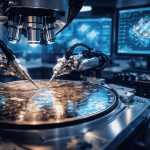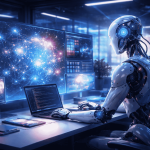
AI and HPC in Space Exploration: Smarter Universe Simulations
Space is big, but we can’t send humans everywhere yet. This is where AI and HPC in Space Exploration come in. These powerful tools help scientists simulate the universe, test theories, and plan missions. In this post, you’ll learn how AI in Space Exploration work, their benefits, real uses, and what’s next for this exciting tech.
How AI and HPC in Space Exploration Work Together
AI and HPC in Space Exploration are changing how we study space.
-
AI (Artificial Intelligence) learns from data and makes smart choices.
-
HPC (High-Performance Computing) uses supercomputers to do millions of calculations fast.
Together, they solve problems too hard for people alone.
Key Roles of Space Exploration
AI and HPC in Space Exploration help in many ways:
-
Analyzing Huge Data
Satellites and telescopes send lots of data daily. AI sorts this data, and HPC processes it fast. -
Planning Space Missions
AI can help plan safe paths for rovers and spaceships. HPC runs tests to find the best designs. -
Predicting Space Weather
AI checks data about solar flares. HPC models how they might hit Earth or satellites.
Benefits of AI and HPC in Space Exploration
Using AI and HPC in Space Exploration brings many advantages:
-
Faster Discoveries
Supercomputers test ideas quickly. AI spots patterns humans might miss. -
Better Safety
AI helps watch for dangers in space. HPC tests what can go wrong before missions. -
Lower Costs
Running tests on computers costs less than real launches.
Real-Life Uses of AI and HPC in Space Exploration
Space Exploration are not just ideas — they work now.
-
NASA uses AI to guide Mars rovers like Perseverance.
-
The European Space Agency uses HPC to model how planets form.
-
SETI uses AI to look for signals from other life.
These tools help answer big questions: Are we alone? How did stars and planets form?
Challenges of AI and HPC in Space Exploration
Even with great tools, Space Exploration face problems:
-
Massive Costs
Supercomputers are pricey to build and run. -
Need for Skilled Workers
Scientists must learn how to train AI and use HPC properly. -
Data Overload
Space missions send so much data that even AI can’t handle it all sometimes.
The Future of AI and HPC in Space Exploration
What’s next for Space Exploration?
Experts see more smart robots exploring moons and planets. New computers will run faster and use less power. Soon, AI might help build habitats on Mars!
Read more about NASA’s future plans here.
FAQs
1. What is AI and HPC in Space Exploration?
It means using smart software (AI) and fast computers (HPC) to study space and run safe missions.
2. Why is it important?
It saves time, money, and even lives by testing things before we launch rockets.
3. Where is it used?
In data labs, space agencies like ESA, and research centers.
4. Can AI and HPC help find aliens?
Yes! They scan radio waves and telescope data for strange signals.
5. How can I learn more?
Check out NASA’s AI research. For HPC, read Supercomputing News
Conclusion
Space Exploration make it possible to explore the universe from Earth. They help us answer old questions and find new ones. As tech grows, these tools will only get smarter and faster.
Want to stay updated? Open-Source Tools in AI & HPC: Boost Innovation and Efficiency.
Author Profile
- Hey there! I am a Media and Public Relations Strategist at NeticSpace | passionate journalist, blogger, and SEO expert.
Latest entries
 MLOpsDecember 22, 2025Serverless MLOps Pipelines: A Practical Cloud Guide
MLOpsDecember 22, 2025Serverless MLOps Pipelines: A Practical Cloud Guide Data AnalyticsDecember 20, 2025Dark Mode Dashboards: Do They Improve Readability?
Data AnalyticsDecember 20, 2025Dark Mode Dashboards: Do They Improve Readability? Computer Aided-EngineeringDecember 19, 2025How CAE in Semiconductors Shapes Modern Chip Design
Computer Aided-EngineeringDecember 19, 2025How CAE in Semiconductors Shapes Modern Chip Design AI WorkflowsDecember 17, 2025Gemini 3 Flash Model: Build Faster, Smarter AI Apps
AI WorkflowsDecember 17, 2025Gemini 3 Flash Model: Build Faster, Smarter AI Apps

